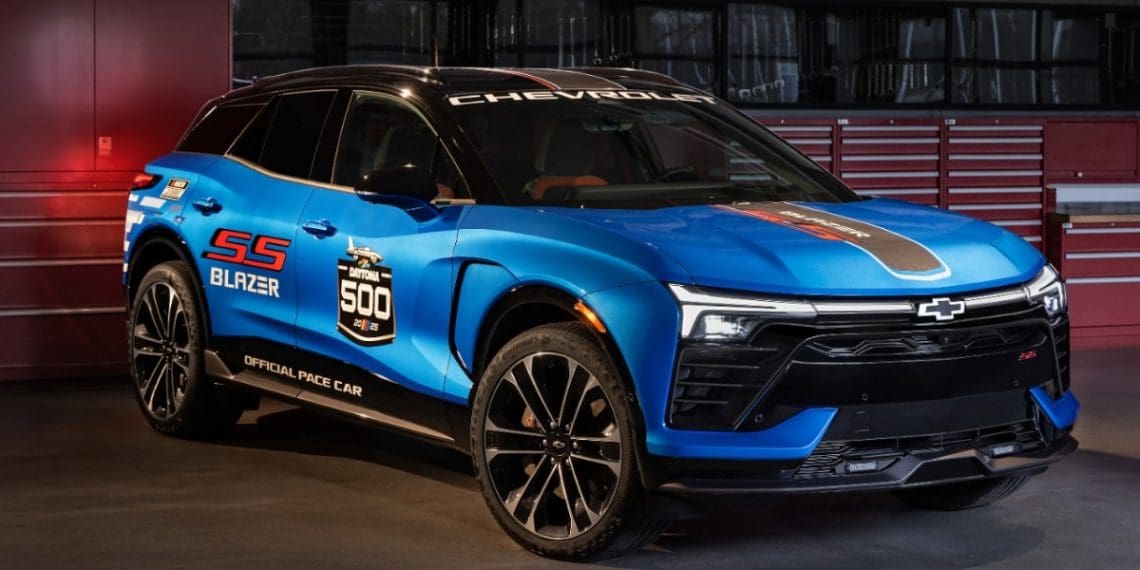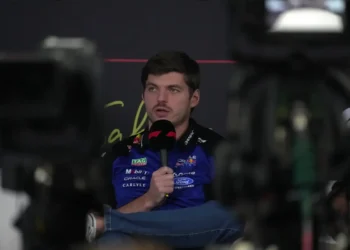The 2025 Chevrolet Blazer EV SS is about to make Daytona 500 history—but not without controversy. In a first for NASCAR, an all-electric vehicle will serve as the pace car, leading the field to the green flag in the sport’s most iconic race.
Chevrolet and General Motors are using this move to showcase the power and potential of electric performance. But for many die-hard NASCAR fans, this moment feels less like progress and more like a threat to the sport’s deep-rooted identity.
A Game-Changer for Motorsports? Or a Slap in the Face to Tradition?
There’s no questioning the Blazer EV SS’s performance credentials. This high-powered machine can launch from 0-60 mph in just 3.4 seconds, backed by 615 horsepower and 650 lb-ft of torque. It’s a showcase of EV performance capability, proving that electric cars aren’t just about efficiency—they can be fast, aggressive, and powerful.
But that’s not what has fans up in arms.
For decades, NASCAR has been synonymous with roaring V8 engines, raw horsepower, and the intoxicating smell of burning fuel. The addition of an EV pace car at Daytona feels like a symbolic push toward an electrified future—one that many traditionalists aren’t ready to embrace.
NASCAR fans aren’t just resisting change for the sake of nostalgia. Their concern is deeply rooted in what makes stock car racing unique—the ability for teams to tinker, modify, and extract every ounce of power from their machines. With EVs limiting mechanical tuning and customization, many believe the sport risks losing its essence if it fully embraces electrification.
Bob Pockrass: NASCAR Fans See Through the Marketing Play
Veteran NASCAR journalist Bob Pockrass weighed in on the debate, posting on X:
“Chevrolet is using the Daytona 500 to promote its new electric vehicle — 2025 Blazer EV SS will be the pace vehicle for the Daytona 500.”
That much is clear—this is a marketing move as much as it is a technological statement. Daytona is NASCAR’s biggest stage, and Chevrolet is capitalizing on that exposure to push its EV lineup.
But the backlash is equally clear. Fans aren’t thrilled about seeing an EV lead the field at the sport’s grandest event, especially when internal combustion engines (ICE) are still the heart and soul of NASCAR.
Chevrolet’s Strategy: EVs Lead the Cup, ICE Still Rules the Weekend
Interestingly, Chevrolet isn’t abandoning traditional powertrains just yet. While the Blazer EV SS will pace the Daytona 500, Chevrolet is keeping ICE cars in the mix for the other races:
- Corvette Stingray will serve as the pace car for the Xfinity Series United Rentals 300
- Chevrolet Silverado RST will lead the field for the Craftsman Truck Series race
This suggests that while Chevrolet is pushing EVs, it’s also mindful of keeping its traditional racing fans engaged.
Where Does NASCAR Go From Here?
The arrival of an EV pace car at Daytona isn’t the same as NASCAR going fully electric, but it does reignite the debate about where the sport is headed.
For now, NASCAR remains a V8-powered battleground, with hybrids expected to debut before full electrification. But as manufacturers like Chevrolet, Ford, and Toyota shift their production focus toward EVs, how long can NASCAR resist the inevitable push toward electrification?
One thing’s for sure: the conversation about NASCAR’s electric future is far from over—and with the Blazer EV SS leading the way at Daytona, it’s only going to get louder.










